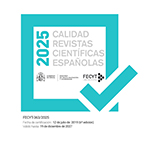Lucha feminista gitana en España, lucha interseccional: El combate contra el Antigitanismo en las redes sociales en España
Resumen
Este artículo tiene como objetivo recoger cómo el Antigitanismo en España es confrontado actualmente por las mujeres gitanas, especialmente en sus discursos en las redes sociales. Mediante la identificación y análisis cualitativo de espacios y herramientas online que tiene a su disposición el feminismo gitano, principalmente Facebook y Twitter, analizaremos los principales temas y estrategias que surgen entorno a la articulación entre la lucha feminista y la lucha contra el Antigitanismo. La muestra seleccionada comprende 459 publicaciones procedentes de seis páginas en Facebook y seis cuentas en Twitter sobre un periodo de siete meses (septiembre 2019 - abril 2020). Los resultados desvelan los principales temas alrededor de los cuales el feminismo gitano construye sus luchas, y las diferentes estrategias que emplea para confrontar el feminismo blanco (payo) con sus prejuicios raciales: la pedagogía, la denuncia, la llamada a la acción y la construcción de redes y alianzas. Detectamos que Facebook se utiliza sobre todo para comunicarse con la propia comunidad, mientras en Twitter las activistas se dirigen principalmente al feminismo payo. Además, destacamos la existencia de dos perfiles complementarios en la actuación de estas mujeres en las redes: la ‘feminista gitana’ y la ‘gitana feminista’, que ponen el énfasis en el eje del género y de la etnia respectivamente, sin obviar los otros ejes de desigualdad. Se observó una gran cantidad de publicaciones relacionadas a la lucha feminista global, como el 8M o el 25N, pero también temas como maternidades, violencia obstétrica y derechos reproductivos, medios de comunicación y, a partir de marzo 2020, los brotes de Antigitanismo a raíz de la crisis sanitaria relacionada con el Coronavirus. Este artículo busca contribuir a los debates sobre el Antigitanismo en España dando visibilidad a las luchas de las mujeres gitanas, desde una perspectiva poco abordada, que es la del feminismo interseccional.
Descargas
Descarga artículo
Licencia
La revista Investigaciones Feministas, para fomentar el intercambio global del conocimiento, facilita el acceso sin restricciones a sus contenidos desde el momento de su publicación en la presente edición electrónica, y por eso es una revista de acceso abierto. Los originales publicados en esta revista son propiedad de la Universidad Complutense de Madrid y es obligatorio citar su procedencia en cualquier reproducción total o parcial. Todos los contenidos se distribuyen bajo una licencia de uso y distribución Creative Commons Reconocimiento 4.0 (CC BY 4.0). Esta circunstancia ha de hacerse constar expresamente de esta forma cuando sea necesario. Puede consultar la versión informativa y el texto legal de la licencia.











